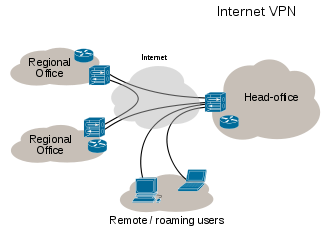Every station on a PSN (packet switched network) that is based on the TCP/IP protocol (your computer is one, for example. Yes, we're referring to a host that is connected to the net) must have an IP address, so it can be identified, and information can be relayed and routed to it in an orderly fashion.
An IP address consists of a 32 bit logical address. The address is divided
into two fields:
1) The network address:
Assigned by InterNIC (Internet Network Information Center).
In fact most ISPs (internet service providers) purchase a number of addresses
and assign them individually.
2) The host address:
An address that identifies the single nodes throughout the network. It can be assigned
by the network manager, by using protocols for it such as DHCP, or the workstation itself.
[The IP networking protocol is a logically routed protocol, meaning that address 192.43.54.2
will be on the same physical wire as address 192.43.54.3 (of course this is not always true. It depends on the subnet mask of the network, but all of that can fill a text of its own)
IP address structure:
---.---.---.---
^ ^
| |
network | host
Every " --- " = 8 bits.
The first bits ===> network address
The last bits ===> host address.
with 8 bits you can present from 0-255 . (binary=(2 to the power of 8)-1)
Example:
11000010.01011010.00011111.01001010 (binary)
194.90.31.74 (decimal)
Notice the address range 127.X.X.X.
These addresses are assigned to internal use to the network device, and are
used as an application tool only. For example: 127.0.0.1, the most common one,
is called the loopback address - everything sent here goes directly back to
you, without even traveling out on the wire.
Also, some IPs are reserved for VPNs - Virtual Private Networks. These are
local area networks over wide area networks that use the Internet Protocol to communicate, and each computer inside the network is assigned with an IP address. So, suppose a certain computer wants to send a data packet to
another host on the network with the IP 'x', but there's also another host on
the Internet that has the same IP - what happens now?
So this is why we cannot use these and other forms of reserved IPs on the Internet.

Your Friend

- Manpreet Singh Bindra
- PATIALA, PUNJAB, India
- Please Give Your Valuable Feedback manpreetsinghbindra@hotmail.com
Search Of Your Interest
4G Technology
(1)
AIRTEL Success Story
(1)
AREA NETWORKS
(1)
Apple 3G iPhones Improving Networking
(1)
BSNL DATAONE broadband disconnect problem
(1)
Basic Concept Of TELECOMMUNICATIONS SYSTEM
(1)
Basic and Simple Definition to 3G
(1)
Business Network
(1)
Business Strategy for Growth
(1)
Business Wireless Planning Strategy
(1)
CCTV IP camera
(1)
CISCO : how IGRP make large INTERNETWORKS in organizations
(1)
CISCO Solutions Provide
(1)
CTT6800+ -JPEG 2000 Compressed Transport Transceiver
(1)
Change of IP Address
(1)
Connectionless packet switching and routing
(1)
Core Network of 3G
(1)
Core Networking In MICROSOFT WINDOWS SERVER 2003
(1)
Current Protocols Essential Laboratory Techniques (CPET)
(1)
Difference between 2G - 3G - 4G & What is 4G & its Advantages ?
(1)
Different Business Networking Types
(1)
DirectX proportional to Networking
(1)
FREE Wi-Fi
(1)
Finisar :Traffic Generation
(1)
Fox Business Network
(1)
GPRS Core Network
(1)
HBR Technologies (HBR)
(1)
HOW TELEPHONE NETWORK SYSTEM WORKS
(1)
History of packet switching
(1)
How To Setup Wireless Connection(APPLY SAFETY SETTINGS FIRST)
(1)
How to Network 2 Computers Without a Hub or Router
(1)
How to Use a Wireless Network Connection with a Windows XP Portable Computer at Home and Work
(1)
How to make a proper website on NETWORKING
(1)
How to troubleshoot wireless network connections in Windows XP Service Pack 2
(1)
IP Addresses
(1)
Importance of BANDWIDTH in DSL Internet Connections
(1)
Internet and its Component
(1)
Introduction to LAN
(1)
Is Your Networking Caught A Virus?
(1)
Long Term Evolution (LTE)
(1)
MICROSOFT the WORLD WIDE LEADER in NETWORKING
(1)
Multi-Core Processing
(1)
Multi-core networking
(1)
NETWORKING CORE
(1)
NETWORKING IN MEDICAL APPLIANCES
(1)
NORTELVisitor-Based Networking Solution
(1)
Network Design
(1)
Network Protocols
(1)
Nokia Dual Sim Phones
(1)
OPTICAL CHARACTERISTICS OF LEDS
(1)
Packet switching in networks
(1)
Pressure Swing Adsorption(PSA)
(1)
Proxy Servers HIDE IP address from WEB NOT other INFORMATION
(1)
Purpose of Business Network or Networking
(1)
Role of EGP and BGP in the TCP/IP (Exterior Routing Protocols)
(1)
SOLUTION Providers to NETWORK Companies
(1)
STP topology of a Switched Network
(1)
STRUCTURED CABLES IN TELECOMMUNICATION
(1)
SeaTalk NG network
(1)
Setting Priorities for Next-Generation Web Apps - MICROSOFT
(1)
Social Network Services
(1)
Social Networking Services to Expand Business
(1)
Speed UP Your PC in 3 Easy Steps
(1)
Spyware affecting Networking
(1)
Sysinternals File and Disk Utilities
(1)
Sysinternals Networking Utilities
(1)
Sysinternals Security Utilities
(1)
TENA and NetAcquire
(1)
UNIX Network Security Architecture
(1)
WAN and Home Networking
(1)
What Network Administrators Think of NETWORKS
(1)
What Nortel Solutions can Provide? Case Study
(1)
Why Not Reserved IPs on Internet
(1)
WiMAX
(1)
Wireless Code Division Multiple Access (CDMA)
(1)
koollage-blogs-news
(1)
~ (DDBMS) DISTRIBUTED DATABASE MANAGEMENT SYSTEM
(1)
~ ActiveVideo system
(1)
~ Advanced Shellcoding Techniques
(1)
~ Cisco VTP: VLAN Trunking Protocol
(1)
~ Features of the Web
(1)
~ How Core Networking Solve Problems?( Solutions provided by Core Networking)
(1)
~ Modulation Techniques for Wireless
(1)
~ Trillium Multi-Core Software
(1)
~ Wi-Fi Networking News
(1)
Core Networking

Why Not Reserved IPs on Internet (STRUCTURE of an IP ADDRESS)
Labels: Why Not Reserved IPs on Internet
Subscribe to:
Post Comments (Atom)


1 comments:
great !!!!
Post a Comment